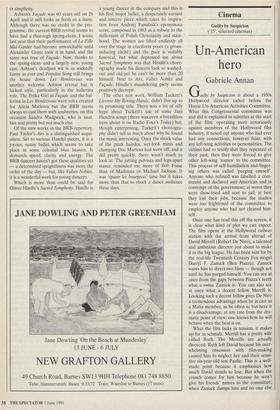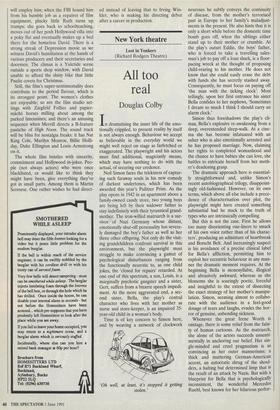Cinema
Guilty by Suspicion (`15', selected cinemas)
Un-American hero
Gabriele Annan
Guilty by Suspicion is about a 1950s Hollywood director called before the House Un-American Activities Committee. What this Congressional committee was and did is explained in subtitles at the start of the film: operating most notoriously against members of the Hollywood film industry, it nosed out anyone who had ever had any connections, however faint, with any left-wing activities or personalities. The victims had to testify that they repented of their past; then they were forced to give other left-wing `names' to the committee. This process of self-humiliation and finger- ing others was called 'purging oneself. Anyone who refused was labelled a com- munist and declared anti-American and in contempt of the government; at worst they were show-tried and sent to jail; at best they lost their jobs, because the studios were too frightened of the committee to employ anyone who had not cleared him- self.
Once one has read this off the screen, it is clear what kind of plot we can expect. The film opens at the. Hollywood railway station with the arrival from abroad of David Merrill (Robert De Niro), a talented and ambitious director just about to make it in the big league. He has been sent for by the real-life Twentieth Century Fox mogul Darryl F. Zanuck (Ben Piazza). Zanuck wants him to direct two films — though not until he has purged himself. You can see at once from the gaps between Piazza's teeth what a swine Zanuck is. You can also see at once what a decent fellow Merrill is. Looking such a decent fellow gives De Niro a tremendous advantage when he is cast as a Mafia member, as he often is; but here it is a disadvantage, at any rate from the dra- matic point of view: one knows how he will behave when the heat is on.
What the film lacks in tension, it makes up for in schmalz. Merrill has a pretty wife called Ruth. The Merrills are actually divorced: Ruth left David because his over- whelming obsession with film-making caused him to neglect her and their sensi- tive six-year-old son Paulie. This is a well- made point because it emphasises how much David stands to lose. But when the crunch comes for him because he won't give his friends' names to the committee; when Zanuck dumps him and no one else will employ him; when the FBI hound him from his humble job as a repairer of film equipment, plucky little Ruth turns up trumps: she goes back to schoolteaching, moves out of her posh Hollywood villa into a poky flat and eventually makes up a bed there for the homeless David. There is a strong streak of Depression movie as we witness David's humiliation at the hands of various producers and their secretaries and doormen. The climax is a Yuletide scene outside a sports shop window, with David unable to afford the shiny bike that little Paulie covets for Christmas.
Still, the film's super-sentimentality does contribute to the period flavour, which is its strongest point. The women's clothes are enjoyable; so are the film studio set- tings with Ziegfeld Follies and papier- mfiché horses milling about among the parked limousines; and there's an amusing sequence when Merrill directs a B-feature pastiche of High Noon. The sound track will be bliss for nostalgia freaks: it has Nat King Cole, Marilyn Monroe, Billie Holli- day, Duke Ellington and Louis Armstrong on it.
The whole film bristles with sincerity, commitment and Hollywood in-jokes. Peo- ple (not always actors) who were once blacklisted, or would like to think they might have been, give everything they've got in small parts. Among them is Martin Scorsese. One rather wishes he had direct-
ed instead of leaving that to Irving Win- kler, who is making his directing debut after a career in production.



















































 Previous page
Previous page